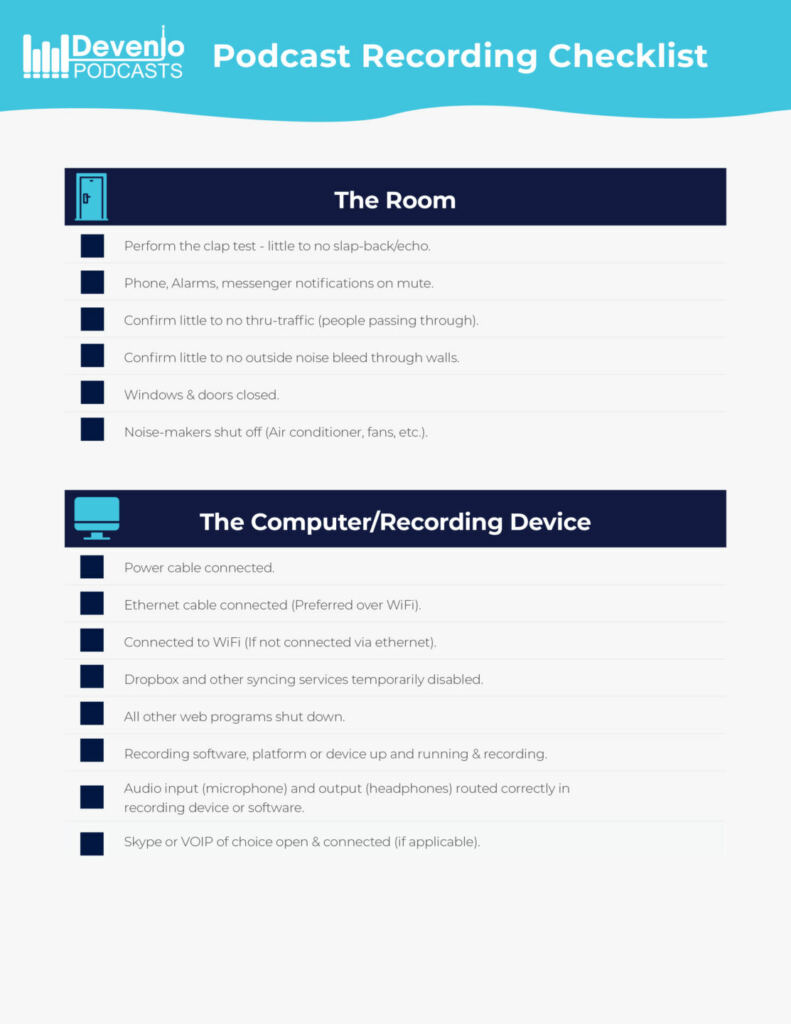If you’re planning on publishing your first podcast, you may be asking the question “How do I publish my show to Apple Podcasts or Spotify?” This is where a podcast hosting platform comes in.
Think of these hosting platforms as a centralized hub to upload your episode files and broadcast them out to the world. Not only will they store and publish your episodes, but they’ll also provide you with valuable listener data, including the number of subscribers you have, episode downloads and much more.
If you read our blog post “5 Things You Need To Start A Podcast (Besides The Audio),” you already know that a podcast hosting platform is essential to getting your podcast up and running. In this post we are going to dive deeper into podcast hosting and give you a better understanding of how it works and how to choose a platform that’s right for you.
But first, let’s dive into some basics so we can better understand what a podcast hosting platform is doing for you. If you already have a firm grasp on this, feel free to skip ahead to learn the keys to selecting the hosting platform that’s right for you.
Understanding The RSS Feed

The RSS feed is the foundation of all podcasting and is the defining feature that sets it apart from other traditional content formats. In fact, without an RSS feed, some purists may not even consider your show a podcast at all! Since the first podcast episode published way back in 2003, the RSS feed has been at the heart of the podcasting ecosystem.
So what is an RSS feed, anyway?
RSS stands for “Really Simple Syndication,” and that’s exactly what it does. Your RSS feed is a link that your listeners can subscribe to, so that whenever new content is published, they are notified directly on their phones in real-time!
With this in mind, when you create a new show on your hosting platform, you are essentially creating a new RSS feed through which all of your episodes will be posted.
Podcast directories like Apple Podcasts and Spotify are constantly checking these RSS feeds and will update content on their platform whenever it sees a new episode posted to the link. And unlike traditional content, when this happens, your subscribers will receive a notification directly on their phones, alerting them that a new episode has been published!
This system simplifies the content delivery process for podcasters and enhances the listening experience for the audience, fostering a seamless connection between content creators and their listeners.
So Why Do You Need A Podcast Hosting Platform?

RSS Feed Creation & Management
Well, for starters, podcast hosting platforms create the RSS feeds for you and help manage distribution to all the podcast directories like Apple Podcasts and Spotify. Creating an RSS feed manually can be a bit of a process (not to mention requires some coding), and hosting companies will simplify this for you, generating one automatically so that you’re ready to go immediately.
Once created, and after some user setup within directories, it will make itself available to all podcast directories, publishing your show to podcast players like Apple Podcasts, Spotify, Pocket Casts, and much more.
Secure Content Hosting
Your episodes need to live somewhere on the internet so that your audience can have access through your RSS feed. To do this, you’ll need to host your audio on a public server. You could do this yourself, but you’d need expensive server hardware and plenty of harddrive space to house large media files. With larger audio files (especially with longer episodes), podcasts can take up a lot of space. This can get involved and expensive very quickly!
Luckily, a hosting platform will enable you to upload your audio content directly onto their public servers and update your RSS feed automatically. And while hosting your audio content is its main feature, it will also host peripheral files like episode show notes, transcriptions, and series artwork all within the same server. They also provide an easy-to-use, browser-based account hub, in which you can manage your series content in real-time and make changes on the fly.
Show & Listener Analytics
Hosting platforms will also provide real-time insights into your podcast performance. The number of downloads per episode, demographic information about your listeners, and your top performing episodes are all data sets you’ll have access to. This data will be instrumental to better understanding your audience and making informed decisions about the content you’re creating.
Publishing & Promotional Tools
Many hosting platforms will provide specialized tools to help you publish your podcast episodes on your website, or (if you don’t already have a website) create a web page specifically for your show.
If you already have a website and want to publish episodes on a dedicated page, your hosting platform will provide you with audio player embed codes that you can inject directly into your webpage’s html coding. Some will even provide episode playlist embed codes so that you can publish playlists of your entire series directly on a dedicated page.
If you don’t already have a website, or would prefer to start from scratch, many hosting platforms will provide you with a custom webpage tied to the existing server within your account. And while you are limited by certain template restrictions, you will have the opportunity to customize with your brand colors, logos and even (in some cases) fonts.
Monetization Opportunities
A bit more of an advanced feature, but some hosting platforms offer additional monetization options, like paid subscriptions, sponsorships, and ad insertion. And while you may not be looking to monetize your show right out the gate, these tools can become very important once you’ve built an engaged audience.
Ad insertion tools specifically have become more standard over the years and many hosting platforms have robust tools for managing your advertising with dynamic ads, updating campaigns throughout the entire history of all your episodes. This allows you to maximize impressions and ultimately engagement. Happy advertisers are always a good thing!
How To Choose Your Podcast Hosting Platform

There are many podcasting hosting providers, including Libsyn, Podbean, and Buzzsprout. We even offer competitive podcast hosting plans at Devenio Podcasts. But with so many options available, how do you select the plan that’s right for you?
There are many factors to consider when choosing your hosting platform. We can break these factors down into three major categories that should always be top of mind when making you decision.
Pricing structures
Pricing models will vary depending on the platform you choose, but they are typically determined by the number of monthly downloads your show receives. With this model, hosting providers will give you a number of tiers to choose from based on the amount of downloads you receive in a monthly cycle. Once you exceed this monthly limit, it’s time to upgrade to the next tier.
While this model seems to be the most common, some pricing models will be determined by the amount of content uploaded to the server in any given month. The more episodes you upload a month, the more storage required, and therefore, a higher monthly price.
Generally, for new podcasters, plans can start between $10-$20 a month and should offer more than enough storage and/or bandwidth for monthly downloads. That said, this is something you should keep an eye on while publishing episodes so that you’re ready to upgrade once you’ve outgrown your tier.
Storage Options
As mentioned in the pricing above, storage and bandwidth are the two main elements when it comes to podcast hosting services. In simplest terms, how much storage do I have available for my episode files and how many downloads a month am I allowed of those files?
Some hosting platforms will measure storage by the number of hours in episode length rather than the file size. This can be a vastly different measurement than the actual file size of your episodes. Understanding how your hosting platform is measuring your storage limits is incredibly important when deciding which provider to use.
Integrations
Some podcast hosting is proprietary and won’t actually connect an RSS feed to public podcast directories like Apple Podcasts. Because of this, you’d be limiting yourself to one directory, and thus, vastly limiting your audience reach. This is something you should definitely keep in mind when picking your hosting provider. Ultimately, you’ll want to be sure that your hosting platform is using an RSS feed to publish to all podcast players.
You can also look into other integration features like Twitter auto-posting, Newsletter publishing with MailChimp, and custom integration offerings with API. Many hosting platforms offer these advanced integrations as well.
Analytics, Publishing, & Promotional Tools
Lastly you’ll want to look at the suite of publishing tools the hosting provider will provide you. Analytics will be most important as the more information you have on your audience and your content the better. You’ll want to look into the different KPIs the hosting platform will give you on any given report and make sure, at the very least, you have the basics like:
- Number of Subscribers
- Number of Monthly Downloads
- Average downloads within first 7, 30, and 60 days
- Number of downloads per episode
- Podcast player breakdowns
You’ll also want to look into what sort of publishing tools you’ll have available. Does the hosting platform provide you with embed codes for episode players? Will they allow you to create a custom webpage built within the server? Consider these tools when selecting your hosting platform.
Level-Up with Advanced Hosting

So while all of these features are somewhat standard across the industry, we consider this “basic hosting.” It gives you the bare minimum of what you’ll need to publish and manage your podcast. But what if you want to take things to the next level and fully integrate your podcast into your overall marketing strategy and techstack? What if you want to dive deeper?
The truth of the matter is, while any podcaster can tell you how many subscribers they have at any given time, the majority (if not all of them) are anonymous listeners. We know how many people are listening, but we don’t really know who they are.
With our Advanced Hosting plan, not only would you have access to all the basic services and tools you’ll get with any basic hosting plan, but you’ll now be able to further identify listeners and their account data, track their engagement through the buyer journey, and finally attribute ROI to your podcast initiatives! And the icing on the cake? With marketing automation integrations (like Marketo), you can now combine this podcast data automatically with your overall marketing data.
The Advanced Hosting Plan also provides some advanced content tools that will allow you to easily repurpose episodes into more short-form content, or even other content initiatives outside your podcast, fully integrating your podcast with your overall content marketing strategies.
If you’re really looking to maximize the impact of your podcast and ultimately track attribution and ROI, the Advanced Hosting plan is for you!
Which One Will You Choose?
Phew! After all that, I’m sure you understand why a podcast hosting platform is a necessity for any podcaster looking to publish their episodes on players like Apple Podcasts and Spotify. They’ll offer storage and bandwidth for your episodes, publish to all podcast directories, provide performance analytics & insights, and offer publishing and promotional tools for you to maximize your show’s impact.
You can get started on your podcasting journey by checking out our Podcast Hosting plans here. If you’d like to learn more about what you’ll need to publish your first podcast, check out our blog post “5 Things You Need To Start A Podcast (Besides The Audio).”
Happy Hosting!



